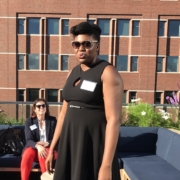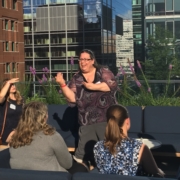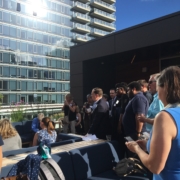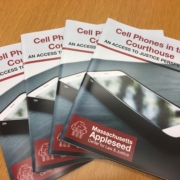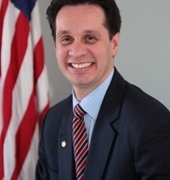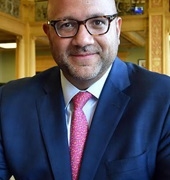Action Alert
Thank you to everyone who raised their voices and called their state senators to advocate for our FY20 budget priorities! The Senate debates have ended, the conferees of the Conference Committee have been decided, and the next stage of this year’s budget battle has begun! You can view the finalized Senate budget here, and take a look below to read more about where we stand on our budget priorities:
Housing and Support Services for Youth Experiencing Homelessness
As you may remember, the Senate Committee on Ways & Means released its FY20 budget proposal and recommended $5 million for support and services for youth experiencing homelessness (line item 4000-0007). Since this was the funding amount advocates requested, no amendment needed to be filed! However, since the final House budget only provided $3.3 million in funding for this line item, the Conference Committee is now tasked with determining the final funding level.
The funding level proposed by the Senate is an important increase to fund vital services for one of Massachusetts’ most vulnerable populations.
Please ask your legislators to urge the Conference Committee to include the Senate funding level of $5 million in the final budget.
Safe and Supportive School Environments
To ensure that all students are empowered to succeed in school, the Safe and Supportive Schools program needs continued funding at an adequate level. We are pleased to report that the Senate Committee on Ways & Means recommended $508,128 in funding for this essential line item (7061-9612), which is slightly ABOVE last year’s funding level. Once again, this meant that there was no need to advocate for an amendment to this line item during the Senate budget debate! However, because the House provided only $400,000 in funding for the Safe and Supportive Schools line item, it will be up to the Conference Committee to determine the final funding amount.
This line item provides critical funding to continue the Safe and Supportive Schools Grant Program, which enables the development of school-wide Action Plans and facilitates the exchange of best practices, and more.
Please join us in advocating for the Senate funding level of $508,128 in the Conference Committee’s final budget.
Civil Legal Aid
Each year we advocate for increased funding for the Massachusetts Legal Assistance Corporation (MLAC) because of the overwhelming need for civil legal aid for low-income families and individuals, which continues to grow.
The MLAC line item (0321-1600) funds free civil legal services that many low-income residents of Massachusetts rely on when facing eviction, domestic violence, and other civil legal crises.
Thankfully, Senator Cynthia Creem’s amendment to increase civil legal aid funding to $24 million was included in the Senate’s final budget! While still less than the $26 million MLAC initially requested, this is a much-needed increase that is greater than the $23.6 million in funding that the House allocated.
Please ask your legislators to urge the Conference Committee to adopt the Senate’s funding amount of $24 million in the final budget.
State ID for Youth Experiencing Homelessness
Senators Chandler and Welch filed Amendment #464 that would work to eliminate barriers homeless youth face in obtaining IDs.
Without state ID, youth experiencing homelessness are prevented from accomplishing many critical and daily tasks, from enrolling in education programs to something as simple as getting a library card.
The amendment would have established a process to waive the prohibitive $25 state ID card fee and created an alternative application process for those who cannot meet existing criteria (such as providing proof of residency). Unfortunately, these policy provisions were not included in the final Senate budget.
While we are disappointed by this development, we will continue to advocate for legislation currently before the Joint Transportation Committee (S.2043/H.3066), which would also ease the process for youth experiencing homelessness to obtain state ID. Click here for more information, and stay tuned to see how you can help advocate to get these common-sense reforms passed this year!
On To the Conference Committee!
The Conference Committee, made up of six legislators – three representatives, three senators – will review both the House and Senate budgets and work to reconcile any differences. The Committee has until July 1st to pass a final reconciled budget and send it to Governor Baker’s desk for approval.
This is a decisive moment for our budget priorities, and we can’t do it without you. When you contact your legislators in support of these funding levels, especially at this final hurdle, you’re helping ensure some of Massachusetts’ most vulnerable communities are supported and empowered to succeed in 2020.
Click here to find your legislator’s contact information. Then call or email both your state senator and representative and ask them to urge the members of the Conference Committee (listed below) to adopt the Senate funding levels for each of these important line items described above.
- Aaron Michlewitz, House Ways & Means Chair
- Denise Garlick, House Ways & Means Vice Chair
- Todd Smola, House Ways & Means Ranking Republican Member
- Michael Rodrigues, Senate Ways & Means Chair
- Cindy Friedman, Senate Ways & Means Vice Chair
- Sen. Viriato deMacedo, Senate Ways & Means Ranking Republican Member
Thank you for your ongoing support and advocacy. With your help, we can ensure these crucial line items receive the funding they need in the coming year.
Want to stay informed on the latest issues Massachusetts Appleseed is working on?
Sign up for future action alerts.



